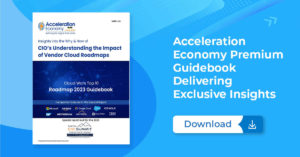As a chief information officer (CIO), few decisions are as critical as selecting the right cloud provider (or, increasingly, multiple providers) for your organization. The success of your business depends on choosing a vendor that meets your unique needs and offers the tools and support necessary to drive innovation and growth.
When I became CIO of Paragon Films, a midmarket manufacturing company, 10 years ago, all of our systems were deployed to an on-premises data center. More recently, we have been migrating our systems to the cloud. Sometimes our application choice dictates which cloud provider we will be using, but when we have multiple providers from which to choose, it’s important to know what to look for. To ensure you make the right choice, there are several minimum requirements you should consider when evaluating cloud providers or vendors.
Reliable and Scalable Infrastructure
Reliability and scalability requirements dictate that providers’ services are always available and can handle an increasing number of users and transactions. For example, Amazon Web Services (AWS) boasts a robust infrastructure that is available in multiple regions worldwide. AWS has built its reputation on providing reliable and scalable infrastructure that can handle massive amounts of data.
One use case for reliable and scalable infrastructure is e-commerce. An e-commerce business must have a website that is always available, 24/7, even during peak traffic periods. For example, during the holiday season, an e-commerce website may experience a massive surge in traffic, which could cause downtime or slow performance if the infrastructure is not designed to handle the increased demand.
With a cloud provider like AWS, e-commerce businesses can rely on a global, scalable, and reliable infrastructure that can handle even the highest levels of traffic. In addition, AWS offers a range of services that are specifically designed for e-commerce, such as Amazon Elastic Load Balancing and Amazon CloudFront, which can help further help businesses scale their infrastructure and improve website performance. Since AWS’s infrastructure is available in multiple regions worldwide, it allows businesses to choose the region that is closest to their customers to minimize latency and improve website performance. At the same time, cloud infrastructure across the globe means there are more options for redundancy in the case of system outages.
My company is focused on manufacturing, but if we were to expand our business into e-commerce, I would likely go with a provider such as AWS that caters specifically to e-commerce through both services and infrastructure. It’s no coincidence that an e-commerce-optimized cloud offering would come from a company that got its start in e-commerce.
Competitive Pricing
Pricing is an important factor to consider when evaluating a cloud provider, as it can have a significant impact on the overall cost of ownership for a business. In addition to attractive pricing, a cloud provider must also offer flexible pricing options that can be tailored to the specific needs of the customer. For instance, Microsoft Azure offers a range of pricing options, including pay-as-you-go. This can be particularly cost-effective for businesses with fluctuating workloads, as they can scale their usage up or down as needed to avoid overpaying for unused resources.
Azure also offers a range of discounts and cost-saving options, such as reserved instances, which can provide significant savings for businesses that have predictable workloads. Additionally, Azure offers a free tier for select services, allowing businesses to try out the platform without incurring any costs. My team, for example, has had the freedom to experiment with several Azure products and services without worrying about running up a big bill while still in the development stage. Also, as we are fairly new to using many of these cloud services, it is helpful to us to lean on pay-as-you-go pricing until we have a better understanding of our needs, and we can commit to longer-term contracts that will save us money down the road.
Flexible and Customizable Solutions
A vendor/cloud provider should offer solutions that can be customized to meet the specific needs of their clients and channel partners. Google Cloud offers a solution that can be tailored to meet specific business needs. For example, it was recently announced that Mercedes-Benz plans to build its own branded navigation using new in-car geospatial data and navigation capabilities from Google Maps Platform. “The companies agreed to explore further collaboration using Google Cloud’s leading artificial intelligence (AI), data, and open infrastructure solutions,” said Google in a press release.
We have seen a flurry of activity around industry-specific and customizable cloud-based AI solutions from several cloud providers recently. I am exploring ways that my company could gain a competitive advantage by tying these new offerings into our technology stack. One potential use that jumps out is real-time, AI-enabled quality control for our manufacturing lines.
Which companies are the most important vendors in AI and Hyperautomation? Click here to see the Acceleration Economy Top 10 AI/Hyperautomation Short List, as selected by our expert team of practitioner-analysts
Proactive Communication
Cloud providers and vendors should proactively communicate with their channel partners, providing regular updates on new products, features, and programs. IBM Cloud, for example, provides regular updates to its channel partners on new product releases, features, and programs. It also communicates with its customers, providing regular updates on new products, features, and programs. And it provides information on any service disruptions or scheduled maintenance that may affect customers’ services.
Customers can access updates through email notifications, the IBM Cloud website, or social media channels. I have found Microsoft Azure to be very effective in communicating with my company about software updates, service disruptions, and scheduled maintenance. It has been my experience that most of the large providers are doing a great job in this area. It’s really when considering newer, smaller providers that you will want to ensure they are also nailing their customer communication.
Stellar Customer Support
Providers and vendors must have excellent customer support to ensure that any issues are resolved quickly and effectively. For example, Workday has a dedicated support team that is available 24/7 to assist customers with any issues they may encounter. Workday provides a comprehensive set of self-service resources, including an extensive knowledge base, online community, and training resources. Customers can access these resources to find answers to common questions, learn new skills, and troubleshoot issues. Workday offers both online and in-person training courses, and customers can also access a variety of self-paced training resources. Similar to proactive communication, robust customer service is not uncommon among the top cloud providers, but I have not always experienced this level of service from smaller players.
A Strong Partner Program
It’s a good sign when providers or vendors have a partner program that makes adequate training, support, and resources available to its channel partners. For example, the ServiceNow Partner Program has five tiers — Registered, Specialist, Premier, Elite, and Global Elite — each with its own set of benefits, including access to ServiceNow technology and tools, marketing support, and dedicated partner support. ServiceNow provides a partner finder that lets you search for a partner on many criteria, including partner type, product line, industry, and geographic region. You can find ServiceNow partners that have expertise in specific industries or domains and can provide valuable insights and knowledge. These partners can also help integrate ServiceNow’s solutions with existing systems and processes.
Since my company is considered mid-sized, and we have a fairly small user base, it can be challenging to get much personal attention from a large cloud provider. That is when a good partner is very helpful. I look for a partner that understands our business but also has a good relationship with the cloud provider. It should be able to help us with most things and then escalate quickly to the provider when it’s needed.
Register here for your on-demand pass to view all content from Partners Ecosystem Digital Summit. The digital event, which took place on April 20, focused on analyzing the business and IT imperatives around cloud, AI, automation, data modernization, and cybersecurity that define the future of partnerships.
Conclusion
Choosing the right cloud provider, or combination of providers, is critical to the success of your business. Choosing the wrong provider can lead to a variety of issues, such as service disruptions, security vulnerabilities, and inadequate support. The basic requirements described in this analysis should provide a checklist for assessing any potential cloud provider. By selecting a cloud provider that meets these requirements, you can ensure that your business stays ahead of the curve when it comes to quickly evolving cloud technology.
Want more tech insights for the top execs? Visit the Leadership channel:










